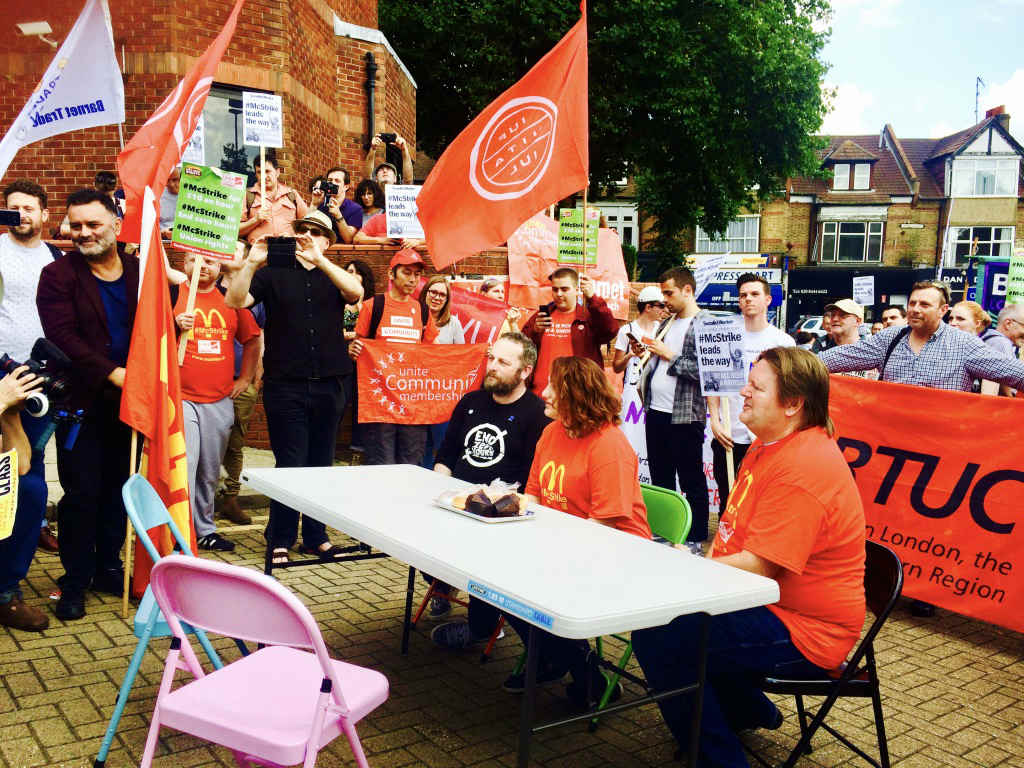 McStrike. Photo: Isabel Carr
McStrike. Photo: Isabel Carr
McDonald’s workers from two branches struck today for the first time in the company’s history in the UK in protest against poverty wages and insecure working conditions, reports Isabel Carr.
Hundreds gathered outside the headquarters of McDonald’s UK operation in East Finchley on Saturday 2 September in support of BFAWU members from their Crayford and Cambridge branches, ahead of this historic strike action.
Saturday’s event saw speakers from the shop-floor, BFAWU, and New Zealand’s Unite union call-out McDonald’s – a global brand and one of the UK’s largest, most profitable, and widely recognised employers – for their treatment of workers, demanding a fair £10 per hour minimum wage, less insecure working hours, acceptable working conditions and the recognition of the workers’ right to form a trade union as employees of the company.
The strike action isn’t only significant as the first of its kind in the UK – it forms part of a growing global workers’ movement. This has seen significant recent gains in both New Zealand with the 2016 ban on zero-hours contracts after a campaign led by their Unite union, and in the US with the “Fight for $15” campaign supported by the Service Employee’s International Union (SEIU). BFAWU reports that more than 10 million US workers are now on the path to $15 an hour as a result of “Fight for $15”, with some 20 million workers having won wage increases since 2012 (BFAWU).
Here in the UK, BFAWU notified McDonald’s in July that workers at their Crayford and Cambridge branches were to be balloted for strike action.
95.7 per cent of McDonald’s workers balloted voted in favour of the strike.
On Monday 4 September pickets were held outside McDonald’s Crayford and Cambridge branches between 6am and 7.30am, followed by a rally at 10.30am in Old Palace Yard in Westminster, central London. This was timed to coincide with Labor Day in the US. There are events in solidarity across the country (see below)
Trade unionists, Trades’ Councils, activists and local Labour parties are already out in force and support from the Labour Party leadership has also been forthcoming. But, as speakers at Saturday’s protest emphasised, the success of this action cannot depend on that alone. The striking workers need support and solidarity from right across the movement and the public. Communities need to organise – in local community groups, in schools, in colleges – to support them and see their demands are met, and extended across the sector as part of the Fast Food Rights campaign (see below).
Workers taking strike action put their financial and professional security on the line, not only for themselves and their colleagues, but for the movement as a whole. It takes guts and it needs – and deserves – our full and practical support.
The workers themselves told Saturday’s protest how much our support means to them – call on your union branch or organising group to get in touch with messages of solidarity, and take part in local and national events to support this action.
Please send messages of support, encouragement and solidarity for the workers to: [email protected]
And please give generously – now – to their strike fund, which can be found here:
https://actionnetwork.org/fundraising/fast-food-rights-uk?source=direct_link&
Information on events in solidarity, and the campaign can be found at:
https://fastfoodrights.wordpress.com

